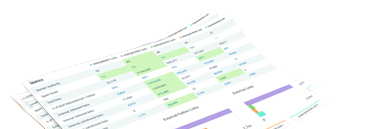Are you looking to dominate your competitors online? Then you need to be using Google Keyword Planner. This powerful tool can help you find the right keywords to target and track your success over time.
Before we get started, we need to understand what Google Keyword Planner is and why it was created!
Google keyword planner is a free tool that Google created to help businesses find the right keywords to target for their marketing campaigns. It can be used to research and track the performance of your current keywords and find new and relevant keywords to target. But it’s especially useful for those looking to dominate the competition.
Google Keyword Planner was created to help businesses find the right keywords to use in their marketing and advertising campaigns. It can also be used to determine the popularity of specific keywords and the competition for those keywords. By using the Google Keyword Planner, businesses can gain a competitive edge over their competitors.
Here are ten tips on how to make the most of Google Keyword Planner for your business:
1. How does Google Keyword Planner work
Google keyword planner is a tool that helps you to get an idea of how often a particular keyword is being searched on Google. It also shows you the competition for that keyword and the suggested bid price.
You can use the Google keyword planner to help you come up with ideas for new blog posts, articles, or even products that you may want to sell online. You can also use it to help you determine whether a particular keyword is worth targeting for your business.
2. How to use Google Keyword Planner to your advantage
Business owners, marketers and pretty much anyone can use Google Keyword Planner to track their website’s search engine rankings, identify high-traffic keywords, and determine how competitive those keywords are. Additionally, marketers can use the tool to get an idea of how much traffic they could potentially receive from ranking in Google’s top 10 for a specific keyword.
As well, Google Keyword Planner is a great tool to help you understand how people are searching for information online. You can use this information to help you choose the best keywords to target with your marketing efforts.
3. Why keyword research is so essential for SEO
SEO (Search Engine Optimization) is all about getting your website as high up in the search engine rankings as possible. One of the most critical factors that determine where your website will rank is your keyword strategy.
Keyword rank is dictated by Keyword strategy
That’s where Google Keyword Planner comes in. You can use it to see which keywords are most popular, the search volume for those keywords, and how competitive they are. This information can help you determine which keywords you should target for your website.
4. How to use Google Keyword Planner to research keywords
One of the best ways to use Google Keyword Planner is to research keywords. You can use it to find out which keywords are being searched for the most, how much competition there is for those keywords, and how much traffic you could potentially get from ranking in Google’s top 10 for those keywords.
To research keywords, simply enter a keyword or phrase into the Google Keyword Planner tool and hit the “Get Ideas” button. It’s that simple!
5. How to use the tool to get ideas for new keywords
Another best way to use Google Keyword Planner is to develop new keywords ideas.
You can use it to find out which keywords are being searched for the most, how much competition there is for those keywords, and how much traffic you could potentially get from ranking in Google’s top 10 for those keywords.
Similar to tip #4, enter a keyword or phrase into the Google Keyword Planner tool and hit the “Get Ideas” button.
You’ll then be presented with a list of related keywords that you can target for your website.
6. Create new AdWords campaigns
You can also use Google Keyword Planner to create new AdWords campaigns. For example, you can use it to find out which keywords are being searched for the most, how much competition there is for those keywords, and how much traffic you could potentially get from ranking in Google’s top 10 for those keywords.
To create a new AdWords campaign, simply enter your keyword or phrase into the Google Keyword Planner tool and hit the “Get Ideas” button. You’ll then be presented with a list of related keywords to target for your AdWords campaign.
7. Use Google Keyword Planner to research competitor websites
In addition to researching your own website’s keywords, you can also use Google Keyword Planner to analyze your competitor’s websites. You can use it to see which keywords they are targeting, how much competition is for those keywords, and how much traffic they are getting from them.
When creating content for your website, it’s important to target keywords being searched for the most. You can use Google Keyword Planner to find out which keywords are being searched for the most, how much competition there is for those keywords, and how much traffic you could potentially get from ranking in Google’s top positions.
To research your competitor’s websites, simply enter their URL into the Google Keyword Planner tool and hit the “Get Ideas” button. You’ll then be presented with a list of related keywords that they are targeting.
8. Use Google Keyword Planner to find new content ideas
Why is content important? Content is vital for a website because it is the backbone of the web page and must be well-written, accurate, and informative. Good content will help improve the site’s search engine ranking.
When it comes to creating content, using keywords is essential.
Keywords allow you to target your audience and ensure that your content is being seen by the right people. Additionally, using keywords can help you rank higher in search engine results pages, which can help you increase traffic to your website.
That’s when Google Keyword Planner helps you find the right keywords to use when creating content!
If you’re having trouble coming up with new content ideas, Google Keyword Planner can be a great help. You can use it to see which keywords are being searched for the most, how much competition there is for those keywords, and how much traffic you could potentially get from ranking in Google’s top 10 for those keywords.
If you’re looking to create or revise your Title tags & Meta descriptions at the same time, you can use Google Keyword Planner as well!
Title tags and meta descriptions are both important for SEO.
Title tags help search engines understand what your page is about, and meta descriptions give searchers additional information about your page that may influence their decision to click through to your site.
In addition, social media platforms often use title tags and meta descriptions as the text when a page is shared on their site. Therefore, it’s essential to make sure that both your title tags and meta descriptions are clear, concise, and persuasive.
To find new content ideas, simply enter your keyword or phrase into the Google Keyword Planner tool and hit the “Get Ideas” button. You’ll then be presented with a list of related keywords to target for your content.
9. How to use Google Keyword Planner to improve your website’s SEO
Google Keyword Planner can be used to improve your website’s SEO in a number of ways. You can use it to research keywords, track your website’s rankings, and find new content ideas.
By using Google Keyword Planner to research keywords, track your website’s rankings, and find new content ideas, you can improve your website’s SEO and get more traffic from the search engines.
Google offers other ways to dominate your competitors; while Google Keyword Planner is an excellent tool for researching keywords, it’s not the only tool out there.
Other Options
There are a number of other tools that you can use to supplement your research and get even more information about your target keywords. Check out these two other Google Tools to try below:
Google Trends
Google Trends is a great tool for seeing how popular a keyword is. You can use it to see how the popularity of a keyword has changed over time, which can be helpful in determining whether or not a keyword is worth targeting.
BuzzSumo
BuzzSumo is another excellent tool for analyzing performing content. For example, you can use it to see how many people liked or shared content across multiple social media platforms. It’s a hidden gem!
We always strongly recommend using the Google Keyword Planner because you can compile a list of the most popular keywords related to your business.
You can then use those keywords in your marketing and advertising campaigns, on your website, and in your content.
Using the right keywords can attract more customers to your business and overtake your competition.
Bonus!
Using Google Keyword Planner for PPC
Another great way to help you generate more leads and sales using Google Keyword Planner is using it for PPC (Pay-Per-Click), how do you ask?
Using Google’s Keyword Planner for PPC can be a great way to get started with your campaign. It can help you determine which keywords are the most relevant to your business, as well as how much traffic you could potentially receive from those keywords. You can also use the tool to estimate how much you might be willing to pay for each click on a particular keyword.
Finding Niche Keywords
One of the best things about the Google Keyword Planner is that it helps you find niche keywords.
This means that you can target specific, high-traffic keywords relevant to your business. By doing this, you can attract more customers and overtake your competition.
By using the Google Keyword Planner, you can dominate your competition and attract more customers to your business.
There are several reasons why you should use the Google Keyword Planner when targeting keywords for your business.
First, it’s free to use, making it an excellent option for small businesses and startups.
Second, it’s a tool that Google provides, so you can trust its data.
Third, the Google Keyword Planner allows you to see how much traffic each keyword gets, which is important for determining whether or not a keyword is worth targeting.
And finally, the Google Keyword Planner can help you find niche keywords, which are high-traffic keywords that are relevant to your business.
Too Good To Be True
You may be wondering; Google Keyword Planner sounds too good to be true, our goal is always to be one hundred percent honest with our clients and readers, so the Google Keyword Planner has several cons, is that it’s not always easy to use. The interface can be confusing, and it can be difficult to find the information that you’re looking for. It also can be extremely slow at times!
We still believe that the Google Keyword Planner is a valuable tool for research keywords despite these cons. It’s a helpful tool that can give you insights into the popularity of a keyword, as well as the average cost-per-click. If you use it correctly, you can dominate your competition and attract more customers to your business.
Google Planner & Social Media
Can you use Google Keyword Planner for your company’s social media?
Yes of course! The Google Keyword Planner can help your business with its social media marketing efforts.
Using the right keywords can attract more customers to your social media pages and overtake your competition.
If you’re looking to start an ad campaign, Google Keyword Planner is an important tool for businesses looking to launch an advertising campaign.
By using the Google Keyword Planner, businesses can see how much traffic a certain keyword gets.
Google Keyword Planner Filters
So now we know the different ways we can use Google Keyword Planner let’s look into the type of filters Google Keyword Planner offers to help you find the right keywords:
Location Filter
This filter allows you to specify the location where you want to see keyword data. For example, you can filter for keywords specific to the United States, Canada, the United Kingdom, or any other country. You can also filter for keywords specific to a particular city, state, or zip code.
Language Filter
This filter allows you to specify the language you want to see keyword data. For example, you can filter for keywords in English, Spanish, French, German, or any other language Google supports.
Device Filter
This is also a valuable filter to use on Google’s Keyword Planner.
This filter allows you to specify the type of device you want to see keyword data. For example, you can filter for keywords specific to desktop computers, laptops, smartphones, or tablets.
Keyword Options Filter
The “keyword options” filter is helpful for using on Google’s Keyword Planner. This filter allows you to specify the options you want to see keyword data. For example, you can filter for a broad, exact, phrase, or negative match keywords.
You can also filter for keywords with a low or high monthly search volume. By using these filters, you can get more accurate data specific to your needs.
What is remarkable about Google Keyword Planner is that you can do a bulk search on Google Keyword Planner, you can use the “Search for new keyword and ad group ideas” function.
This will allow you to enter a list of keywords, and then get data on search volume and competition for each one. You can then use this data to refresh your keyword strategy.
Google Keyword Planner Main Sections
The Keyword Planner is divided into two main sections: “Keyword Ideas” and ” bids and budgets.”
The “Keyword Ideas” Section
Will show you a list of related keywords and the amount of traffic that each keyword could generate. You can also see how much you might be willing to pay for each click on a particular keyword.
The “Bids and Budgets” Section
Will help you estimate how much you’ll need to budget for your PPC campaign, as well as how much you should be willing to pay for each click.
Additionally, Google Keyword Planner can help you estimate how much you’ll need to budget for your campaign and how much you should be willing to pay for each click.
If you’re looking to get started with a Google Ads campaign, the Google Keyword Planner is a great place to start.
Google keyword planner has completely changed the game for businesses.
It allows businesses to not only see how many people are searching for a certain keyword or phrase but also provides information on what the competition is like and how much money could be made by targeting that keyword or phrase. This information is incredibly valuable for businesses and can help them to make






